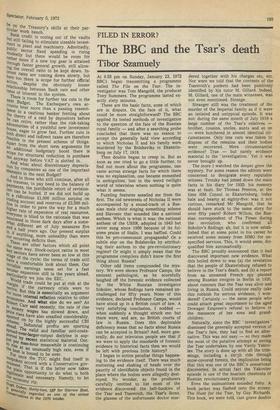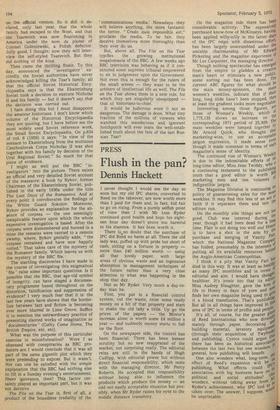FILED IN ERROR?
The BBC and the Tsar's death
Tibor Szamuely
At 9.55 pm on Sunday, January 23, 1972 BBC1 began transmitting a programme called The File an the Tsar. The investigator was Tom Mangold, the producer Tony Summers. The programme lasted exactly sixty minutes. These are the basic facts, none of which are in dispute. On the face of it, what could be more straightforward? The BBC applied its tested methods of investigation to the question of the fate of the Russian royal family — and after a searching probe concluded that there was no reason to accept the generally held view according to which Nicholas II and his family were murdered by the Bolsheviks in Ekaterinburg on July 17, 1918. Then doubts began to creep in. But as soon as one tried to go a little further, to find out more about the programme, one came across strange facts for which there was no explanation, one became enmeshed in ambiguities, lost in the weird twilight world of television where nothing is quite what it seems. Puzzling features assailed me from the first. The old newsreels of Nicholas II were accompanied by a sound-track of a Russian male choir singing something solemn and Slavonic that sounded like a national anthem. Which is what it was: the national anthem of the USSR, adopted in 1943 but never sung since 1956 because of its fulsome praise of Stalin. I was baffled. Could this be pro-communist propaganda? Or a subtle slur on the Bolsheviks by attributing their anthem to the pre-revolutionary regime? Or might it simply mean that the programme compilers didn't know the first thing about Russia? Other odd items compounded the mystery. We were shown Professor Camps, the eminent pathologist, as he scornfully laughed off the forensic evidence collected by the White Russian investigator Sokolov, whose findings have remained unchallenged for fifty years. None of this evidence, declared Professor Camps, would have stood up in a British court of law. A very satisfying conclusion, I nodded — when suddenly a thought struck me: but there were, and are, no British courts of law in Russia. Does this deplorable deficiency mean that no facts about Russia can be accepted in Britain? And, more generally, do not television people see that if we were to apply the standards of forensic evidence to historical facts then we would be left with precious little history? I began to notice peculiar things happening to the evidence itself. There was much muttering and shaking of heads over the paucity of identifiable objects found in the place where the bodies were allegedly destroyed. No wonder, as the producers carefully omitted to list most of the evidence discovered: the belt-buckles of the Tsar and Tsarevich, the Tsar's ikons, the glasses of the unfortunate doctor mur dered together with his charges etc, etc. Nor were we told that the contents of the Tsarevich's pockets had been positively identified by his tutor M. Gillard. Indeed, M. Gillard, one of the main witnesses, was not even mentioned. Strange. Stranger still was the treatment of the murder of the Imperial family as if it were an isolated and untypical episode. It was not: during the same month of July 1918 a large number of the Tsar's relatives — brother, cousins, uncles, aunts and so on — were butchered in almost identical circumstances. Only less care was taken to dispose of the remains and their bodies were recovered. Mere circumstantial evidence? True — but surely evidence material to the 'investigation.' Yet it was never brought up. The more I watched the deeper grew the mystery. For some reason the editors were concerned to denigrate every reputable witness. Trotsky had jotted down the main facts in his diary for 1935: his memory was at fault. Sir Thomas Preston, at the time HM Consul in Ekaterinburg, today hale and hearty at eighty-five: was it not curious, remarked Mr Mangold, that he should have stuck to the same story for over fifty years? Robert Wilton, the Russian correspondent of The Times during the revolution, who confirmed all Sokolov's findings: ah, but it is now established that at some point in his career he received some money from HMG for unspecified services. This, it would seem, disqualified him automatically. The BBC proudly announced that it had discovered important new evidence. What this boiled down to was (a) the revelation that the people of Ekaterinburg refused to believe in the Tsar's death, and (b) a report from an unnamed French spy planted among Russian émigrés in Berlin in 1920, about rumours that the Tsar was alive and living in Russia. Could anyone really take this rubbish for serious evidence, I wondered? Certainly — the same people who could attach great importance to the aged Dowager Empress's refusal to believe in the massacre of her sons and grandchildren. Naturally, since the BBC ' investigators ' dismissed the generally accepted version of the Tsar's fate, they had to find an alternative. This was not easy — so they made the most of the putative attempt at saving the Tsar undertaken by one Vasily Yakovlev. The story is done up with all the trimmings, including a sleigh ride through snow-covered forests, the implication being that this was one of the BBC's sensational discoveries. In actual fact the Yakovlev episode is one of the hoariest chestnuts of Russian revolutionary history. Even the insinuations sounded fishy. A book jacket was flashed onto the screen: The Hunt for the Tsar, by Guy Richards. This book, we were told, cast grave doubts on the official version. So it did: it declared, only last year, that the whole family had escaped to the West, and that the Tsarevich was now flourishing in America under the nom de plume of Colonel Goleniewski, a Polish defector. Jolly good, I thought: now they will interview the self-styled Tsarevich. But they did nothing of the kind.
Then came the thrilling finale. To this day, announced the 'investigator' excitedly, the Soviet authorities have never acknowledged killing the Tsar's family; all that the official Soviet Historical Encyclopaedia says is that the Ekaterinburg Soviet took a decision to execute Nicholas II and his family — but it doesn't say that the decision was carried out.
I hate doing this but I must disappoint the amateur historians. I don't know which volume of the Historical Encyclopaedia they are quoting, but I have before me the most widely used Soviet reference work, the Small Soviet Encyclopaedia. On p.634 of vol. 6 (1959) it says: " In view of the menace to Ekaterinburg from the mutinous Czechoslovak Corps Nicholas II was shot together with his family by decision of the Ural Regional Soviet." So much for that piece of evidence.
I might as well put the BBC 'investigators ' into the picture. There exists an official and very detailed Soviet account of the massacre: a book by Bykov, former Chairman of the Ekaterinburg Soviet, published in the early 1930s under the title The Last Days of the Romanovs. And at every point it corroborates the findings of the White Guard Sokolov. Moreover, Bykov provides an explanation for the ab*ence of corpses — the one seemingly inexplicable feature upon which the whole expensive investigation is based. After the corpses were dismembered and burned in a mine the remains were carried to a remote swamp, where, Bykov genially adds, "the corpses remained and have now happily rotted." That takes care of the mystery of the Romanov family. Which leaves us with the mystery of the BBC file.
The startling discoveries I have made in the course of investigating this enigmatical file raise some important questions. Is it possible that the BBC, that age-old symbol of integrity, can have staged a documentary programme based throughout on the distortion, falsification and suppression of evidence? I very much fear that it is: the last few years have shown that the borderline between fact and fiction is becoming ever more blurred in Lime Grove. Suffice it to mention the extraordinary practice of presenting slanted works of imagination as '
documentaries' (Cathy Come Home, The British Empire, etc, etc).
What was the purpose of this particular exercise in misinformation? Were I as obsessed with conspiracies as BBC producers are I would conclude that it was all part of the same gigantic plot which they were pretending to expose. But it wasn't. Nor can one be satisfied with the simple explanation that the BBC had nothing else to fill in a Sunday evening's entertainment. Sheer ignorance, then? This factor certainly played an important part, but it was not decisive.
The File on the Tsar is, first of all, a product of the boundless credulity of the communications media.' Nowadays they will believe anything, the more fantastic the better. " Credo quia impossible est," proclaim the media. To be fair, they deceive themselves more thoroughly than they ever do us.
But, above all, The File on the Tsar typifies the growing institutional megalomania of the BBC. A few weeks ago BBC television was behaving as if it constituted some supreme tribunal empowered to sit in judgement upon the Government. Not even this is enough for the rulers of the small screen — they want to be the arbiters of intellectual life as well. The File on the Tsar shows them in a new role, for which they are singularly unequipped — tnat of historians-in-chief.
It would be ludicrous were it not so dangerous. The damage is done. What tiny fraction of the millions of viewers who watched this mendacious and ignorant hotchpotch will ever learn the well-established truth about the fate of the last Russian Tsar?











































 Previous page
Previous page